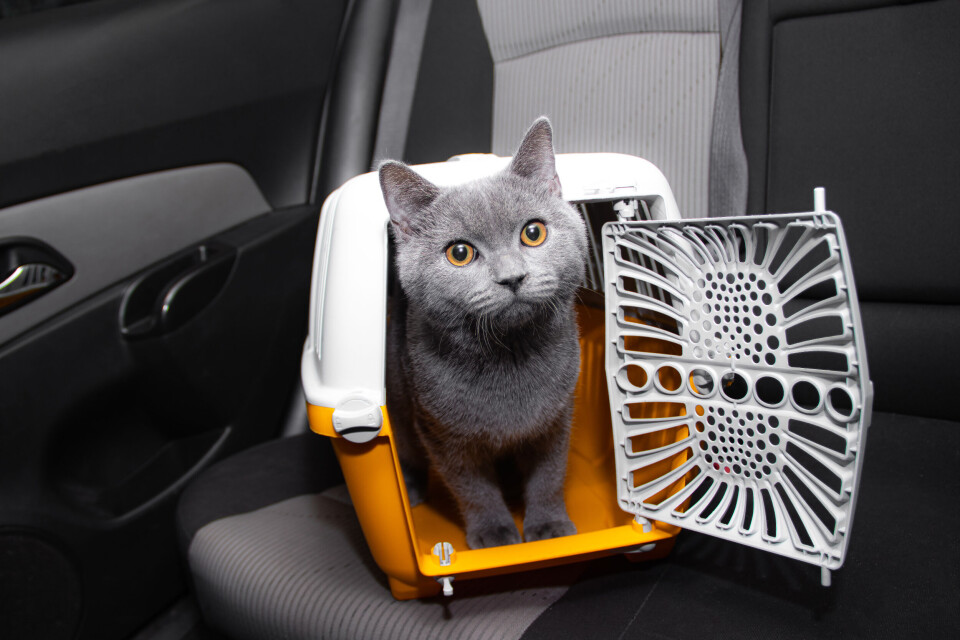-
UK’s ETA transition period ends: what changes for residents of France?
Rules have been toughened for those with dual UK or Irish and another citizenship
-
Rail passenger in France fined €200 for playing music aloud on phone
On-the-spot fine was increased after passenger initially refused to pay
-
Taking a lead from the US: doggy daycare booming in France
Daycare facilities are catering for both busy pet owners and tourists
Reader's tip on pet passport after cat issues boarding UK-France ferry
The animal’s documentation was correct but ferry worker had a problem with its wording. We explain the rules for pet travel between the UK and EU

[Update September 22 at 15:50 - A Connexion reader has informed us that she was quoted £285 for an AHC this year, considerably more than the approximately £100 which has previously been suggested.]
A reader has told how she was informed that the travel documentation she had for her cat to board a ferry from the UK to France could not be accepted even though it was correct.
Rachel*, a retiree who lives in Devon, was travelling from Plymouth to Roscoff on July 2 to spend the summer in her second home in Dordogne with her partner, two teenage granddaughters and pet cat, Polly.
“Before I left, I contacted Brittany Ferries and asked them to check the EU pet passport. I got several emails back from them but they did not not answer the question, starting in June,” she told The Connexion.
“I sent them a copy of the passport and they didn’t reply, so – fortunately – I went and got an Animal Health Certificate (AHC) too.”
People travelling between the UK and the EU with a pet such as a cat or dog must have either an EU pet passport or an AHC. It is not normally necessary to have both.
A British vet had also told Rachel that her EU pet passport was all in order, but she wanted to be sure that the cat would be accepted on board the ship, which is why she paid £130 for the AHC as well.
“The cat is very special to my autistic granddaughter, and if we had lost the cat because we were not able to travel with it, she would have been devastated,” she said.

Rachel’s cat Polly was nearly refused boarding on a ferry from the UK to France, despite having the correct documentation
Issues with the date of microchip reading
“Brittany Ferries had still not got back to me to confirm that the passport was OK, so we headed off to the ferry.
“The man at the gate said: ‘Sorry, you can’t come through because the microchip date is not entered correctly.”
Under EU rules, a pet must be microchipped before or at the same time as it receives its rabies vaccination because this ensures that the animal is identified before it receives the vaccine.
On page three of the EU pet passport is the section: Date of application or reading of the transponder (referring to the identification chip, with ‘application’ referring to the date it was implanted).
Rachel’s cat had been microchipped before it had its rabies vaccination, but its records contained the ‘date of reading’ (‘date de lecture’ in French) of the chip as opposed to the ‘date of implantation/application’. This reading date was the same as that as the rabies vaccination.
Some vets in France will score out the ‘date of application’ of the microchip if they do not know it, and instead only insert the ‘reading date’, which means the date they themselves scanned the microchip.
They will then be likely to mark the reading date as whatever the day’s date is. This is not a problem if they then go on to give the animal a rabies booster shot.
Therefore, in Rachel’s case, the cat’s documentation did fulfil the criteria for travel into the EU.
However, the Brittany Ferries staff member said that the microchip section was presented wrongly and so could not be accepted.
Read more: Why was my dog’s EU pet passport not accepted on UK to France ferry?
“He was adamant that he wouldn’t let me through.”
Rachel said that only when she showed the check-in official her AHC was she allowed to board the ferry with the cat.
If you encounter problems when trying to board a ferry because your pet’s passport only shows the microchip ‘reading date’, you can show the check-in official these EU rules.
They state: “The date of administration of the [rabies] vaccine [must] not precede the date of marking or reading of the transponder,” thus showing that both dates should be accepted.
‘Very distressing’
“When I got to France, I phoned the vet near our house and she said that the EU pet passport was fine,” Rachel said. “She offered me another one for free and I got the cat vaccinated against rabies again so she was all up to date.
“All the vets have been wonderful.
“So then I tried to contact Brittany Ferries to check it all again and make sure that it was all OK.” This time, she did receive a response confirming that her documentation was in order.
Rachel also said that the Brittany Ferries staff at Cherbourg were “perfect” when the family were returning to the UK this month, but that the experience in Plymouth has put her off travelling with her cat again.
“It added a lot of stress and I wouldn't do it again and I’m worried that other people could be caught out. If someone has driven up from Spain [to the port] and then is told: ‘Sorry, your cat or dog can’t come on the boat’, what are they going to do?” she said.
“It is a very distressing situation. I would hate for a pet to be put down because they were refused boarding.
“What I would like for everybody who takes a pet is for Brittany Ferries to have a process where they check the passport before” the passengers arrive at the boat.
Rachel suggested that customers could be asked to upload an image of their pet’s documentation when they add it to the booking, and that this could be authorised in advance of travel to avoid uncertainty.
The Connexion has contacted Brittany Ferries for comment but has not received a response.
Rules on travelling between the UK and EU with a pet
Since Brexit, British pet-owners have two options if they wish to travel to the EU with their animals.
Read also: France travel: what are the rules for flying with a pet?
They can visit a vet in the UK for an animal health certificate (AHC), valid for up to four months for a single trip, onward travel in the EU and re-entry. These can typically cost around £100 each, plus any treatments and vaccinations the pet may need.
Or, they can use an EU pet passport if they have one.
An EU pet passport issued in France will cost between €15 to €20, and can be used for up to 28 trips, including to the UK, where it is valid.
It should be noted, however, that since Brexit took effect, it is only possible to obtain one of these passports if you are in France for at least three months, which would rule out most visitors, who are only entitled to spend up to 90 consecutive days in the country before having to apply for a visa.
So, those who are resident in France or who have a visa allowing them to stay for more than three months could obtain one of these passports, but the pet must be registered by the owner on the French I-CAD register. Furthermore British vets should not have 'input' into it, ie. if the pet needs a vaccine booster, it should be done by a French vet, for example, The Connexion was previously told.
However, people who can only spend up to 90 days at a time in France are not eligible.
The Connexion has, though, heard of French vets issuing non-French residents with EU pet passports.
Rachel already had an EU pet passport acquired before these post-Brexit rules came into effect.
It is no longer possible to use a UK-issued EU pet passport, and if you are obtaining your documentation in the country it must be an AHC.
Read more: Pet passports: Second-home owners in France left ‘upset’ by stalemate
In order to have a valid EU pet passport or AHC, your pet:
- Must be microchipped, and the date of implantation or reading correctly entered in the document. The date of implantation must be prior to the animal’s rabies vaccination
- Must have had its rabies vaccination, and the date of the inoculation must be entered correctly in the documentation.
Pets must be 12 weeks old to have the rabies vaccination and must receive the injection at least 21 days before travel.
- Must have a tapeworm treatment before reentering the UK (dogs only). This treatment must be administered more than 24 but less than 120 hours before the scheduled arrival time in the UK and must be correctly entered in the pet passport
If you are taking a dog on board a ferry, it should wear a muzzle when outside of your vehicle or the kennel.
People who are taking their pet on board a Brittany Ferries ship and who have a query should contact pettravelexpert@brittanyferries.com.
*Name changed on the request of the interviewee.
Have you experienced issues when trying to travel between France and the UK with your pet? Share them with us via news@connexionfrance.com
Related articles
Can I get rabies vaccine in UK for EU pet passport issued in France?
Do I need deworming stamp on my pet passport for UK to France travel?
























